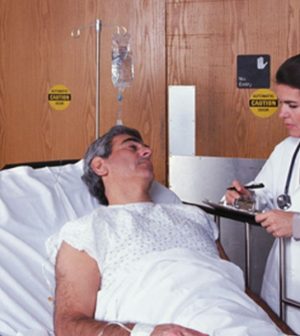- Could Your Grocery Store Meat Be Causing Recurring UTIs?
- Are You Making This Expensive Thermostat Error This Winter?
- Recognizing the Signs of Hypothyroidism
- 10 Strategies to Overcome Insomnia
- Could Artificial Sweeteners Be Aging the Brain Faster?
- Techniques for Soothing Your Nervous System
- Does the Water in Your House Smell Funny? Here’s Why
- Can a Daily Dose of Apple Cider Vinegar Actually Aid Weight Loss?
- 6 Health Beverages That Can Actually Spike Your Blood Sugar
- Treatment Options for Social Anxiety Disorder
Nurses Learn How to Get Patients to Say ‘Yes’ to Blood Thinners

Online training for nurses increased hospital patients’ use of medication that can prevent potentially deadly blood clots, a new study reveals.
Nurses sometimes won’t give the blood thinning drugs if patients don’t want them. So researchers developed the training to teach nurses how to respond when patients say they don’t want to take blood thinners.
The study included more than 900 nurses at Johns Hopkins Hospital in Baltimore. After the online training, the number of patients who refused to take prescribed blood thinners dropped from 12.4 percent to 11.1 percent, the findings showed.
“We teach in hopes of improving patient care, but there’s actually very little evidence that online professional education can have a measurable impact. Our results show that it does,” study senior author Dr. Elliott Haut said in a Johns Hopkins news release.
Haut is vice chair of quality, safety and service in the department of surgery at Johns Hopkins University School of Medicine.
Each year, 350,000 to 600,000 people in the United States are affected by venous thromboembolism (VTE), a blood clot that forms in a vein (often in a limb). And more than 100,000 of those people die when a clot breaks off and travels to a lung. That’s more deaths than from breast cancer, AIDS and motor vehicle collisions combined, the researchers noted.
According to study first author Brandyn Lau, an assistant professor of surgery, “While injectable blood-thinning drugs, such as heparin, can prevent VTE, upwards of 15 percent of prescribed doses are never administered to hospitalized patients, most often due to patient refusal.”
The study was published Aug. 16 in the journal PLoS One.
More information
The U.S. Agency for Healthcare Research and Quality has more on blood thinners.
Source: HealthDay
Copyright © 2026 HealthDay. All rights reserved.










